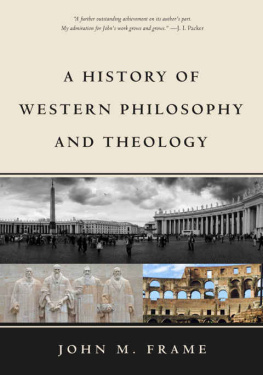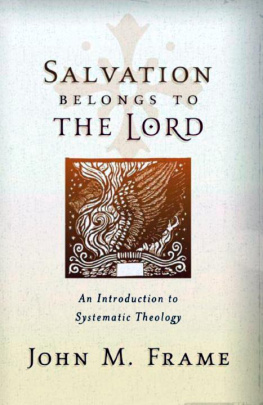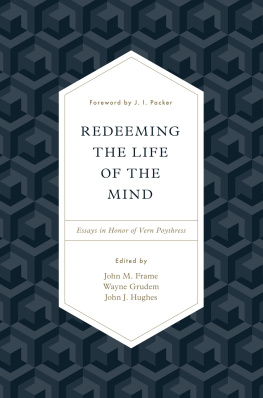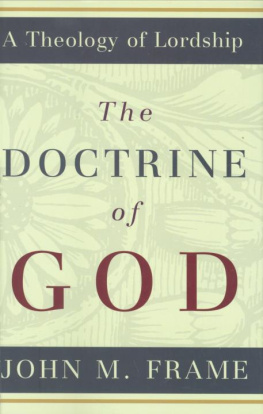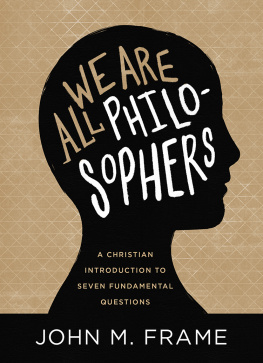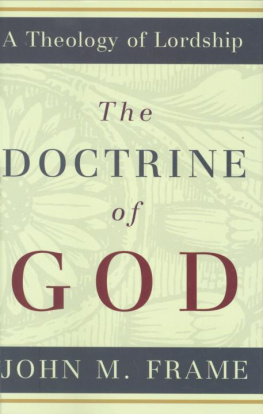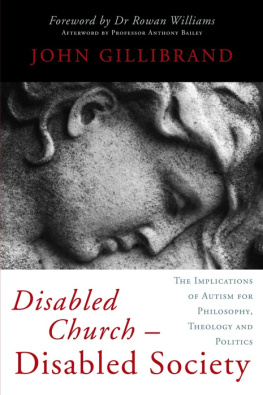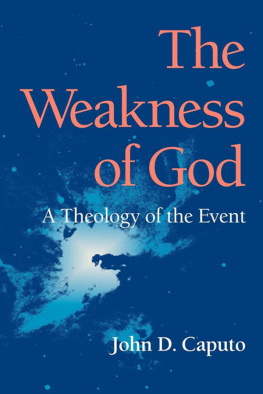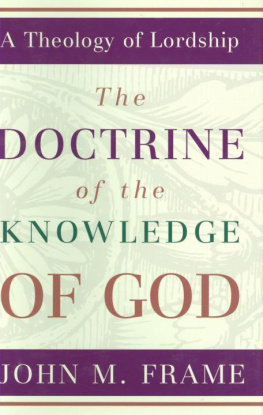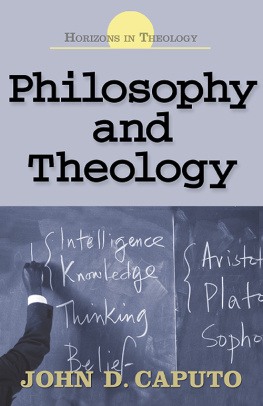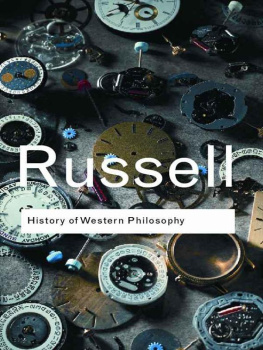John M. Frame - A History of Western Philosophy and Theology
Here you can read online John M. Frame - A History of Western Philosophy and Theology full text of the book (entire story) in english for free. Download pdf and epub, get meaning, cover and reviews about this ebook. year: 2017, publisher: P&R Publishing, genre: Religion. Description of the work, (preface) as well as reviews are available. Best literature library LitArk.com created for fans of good reading and offers a wide selection of genres:
Romance novel
Science fiction
Adventure
Detective
Science
History
Home and family
Prose
Art
Politics
Computer
Non-fiction
Religion
Business
Children
Humor
Choose a favorite category and find really read worthwhile books. Enjoy immersion in the world of imagination, feel the emotions of the characters or learn something new for yourself, make an fascinating discovery.
- Book:A History of Western Philosophy and Theology
- Author:
- Publisher:P&R Publishing
- Genre:
- Year:2017
- Rating:5 / 5
- Favourites:Add to favourites
- Your mark:
- 100
- 1
- 2
- 3
- 4
- 5
A History of Western Philosophy and Theology: summary, description and annotation
We offer to read an annotation, description, summary or preface (depends on what the author of the book "A History of Western Philosophy and Theology" wrote himself). If you haven't found the necessary information about the book — write in the comments, we will try to find it.
A History of Western Philosophy and Theology — read online for free the complete book (whole text) full work
Below is the text of the book, divided by pages. System saving the place of the last page read, allows you to conveniently read the book "A History of Western Philosophy and Theology" online for free, without having to search again every time where you left off. Put a bookmark, and you can go to the page where you finished reading at any time.
Font size:
Interval:
Bookmark:
Philosophia literally means love of wisdom, but from the ancient Greek schools to the present-day halls of academia, philosophers writings have more often reflected the wisdom of the world than the wisdom of the Word, and many have cast more shadow than light. Not so for John Frames latest masterpiece. No other survey of the history of Western thought offers the same invigorating blend of expositional clarity, critical insight, and biblical wisdom. Supplemented with study questions, bibliographies, links to famous quotes from influential thinkers, twenty appendices, and a chapter-indexed glossary, this book would be an excellent choice as the main textbook for a seminary-level course. Overtly and unrepentantly Christian in its perspective, it will be my first recommendation for believers seeking a trustworthy guide to the labyrinthine history of philosophy and theology.
James N. Anderson , Associate Professor of Theology andPhilosophy, Reformed Theological Seminary, Charlotte
The history of secular Western philosophy traces mans many attempts at great thoughts about Gods creation but without God. This has resulted in varied thought-systems that possess fragments of truth capable of appealing to our natural curiosity about the world. Yet without the truth of Scripture acting as the authority over beliefs and values, not only are those fragments unable to provide us with the full picture, but even the little bit they do say is not fully true. In the end, all we are left with is a lie. This was Satans subterfuge with the first woman. He tempted her to accept the hollowness of his lie as the truth. Since that day in the garden, Satans strategy has remained essentially the same. Either he presents for our consideration fraudulent evaluations of the creation in the name of philosophy or he finds ways to mix the tares of false philosophies with the truth of Gods Word in our own hearts and minds, thus confusing us about what is right. In either case, his goal is to tempt us to question what God has said. Responding to this attack, John Frame has provided an invaluable ministry to the church. He puts the history of Western philosophy in its proper context: spiritual warfare. Here we learn that philosophy is more than a set of courses in a college curriculum. It is a field of battle for the hearts and minds of billions. In these pages are exactly the resources you need to bring every thought captive to the obedience of Christ and to be a champion for truth. May this book help prepare you for such a time as this.
John Barber , Pastor, Cornerstone Presbyterian Church,Palm Beach Gardens, Florida
With this volume Frame offers his many devoted readers a triperspectival take on the history of Western philosophy and modern theology. Based on a course that he has been teaching at Reformed Theological Seminary for many years (the text is keyed to lectures available at itunes.rts.edu), and a lifetime of reading and thinking, this volume is the next fat Frame book by P&R Publishing. Although his interpretations of the many thinkers covered in this survey admittedly follow popular conventions, his assessment is distinctly his own. Frames devotion to Van Til, the dedicatee, is evident throughout as he reads this history as the story of the antithesis between Christian thought and all other belief systems. Here, Western thought becomes a narrative of errors, deviations, and idolatry and its study an exercise in preparing oneself for spiritual warfare in the life of the mind. A History of Western Philosophy and Theology rounds out Frames corpus and is required reading for anyone interested in the contours of his thought.
Bruce P. Baugus , Associate Professor of Philosophy and Theology, Reformed Theological Seminary, JacksonWe now have an answer to the question of what would happen if John Frame became something of a Frederick Copleston and did a whole history of philosophy. It is now possible to know, because it has been done. It would combine all the qualities that actually exist in Dr. Frame. It would be a fascinating combination of an irenic but prudent interaction with the whole gallery of thinkers through the ages, and would at the same time be an exercise in the casting out of the demons of humanistic autonomy, self-reference, and self-determination. I have felt since my student days when Dr. Frame was one of my professors that if I could choose anybody to evaluate anything in the intellectual realm (beginning with my own efforts as a student), it would be Dr. Frame. He was the best evaluator I ever sat under. That same quality has now been applied to the whole history of philosophy. Dr. Frame is gentler than Van Til, but (interestingly) just as incisive, with more of an eye for the finer contours and details than the old master himself.
Richard Bledsoe , Metropolitan Missionary, Boulder, Colorado;former PCA pastor
If only! If only I had had this volume from John Frame when I studied philosophy at Vanderbilt as an undergraduate in the late 1960s! That was a time when it seemed that every college student was into philosophy, but most philosophy either was dark and cynical (existentialism) or seemed to ignore the serious evils of those days by seeking to explain everything through clearer language (logical positivism). Frame knows and explains well all the various strands of philosophy, and he puts the world and the history of philosophy in its proper perspective as seen through the lens of the Scriptures, Gods truth about the world and about us. I was not privileged to have Dr. Frames help when I first studied philosophy, but you do have that counsel available to you. Use it.
Robert C. Cannada Jr. , Chancellor Emeritus, ReformedTheological Seminary
When I was a young man, I plowed through Bertrand Russells 1945 classic, A History of Western Philosophy . A couple of years ago I read the much shorter (and more interesting) work of Luc Ferry, A Brief History of Thought . Between these two I have become familiar with many histories of Western thought, each written out of deep commitments, some acknowledged, some not. But I have never read a history of Western thought quite like John Frames. Professor Frame unabashedly tries to think through sources and movements out of the framework (bad pun intended) of deep-seated Christian commitments and invites his readers to do the same. These commitments, combined with the format of a seminary or college textbook, will make this work invaluable to students and pastors who tire of ostensible neutrality that is no more neutral than the next volume. Agree or disagree with some of his arguments, but John Frame will teach you how to think in theological and philosophical categories.
D. A. Carson , Research Professor of New Testament,Trinity Evangelical Divinity School
For this work of great scope, John Frame begins with the simple foundation of a disciple. Eschewing vain promises of value-free consideration of Western thought regarding philosophy, theories of knowledge, and ethics, he freely confesses the Christian necessity of weighing the divine ought behind all human thought and endeavor. As waters run in a furrow, so the mind of the Christian necessarily considers theory, assertion, and imperative in accord with the lines plowed by the Word of God. Frame knows that such presuppositions will marginalize his analysis for secularists blind to their own biases, but he submits thought and praxis to his Master in order to give masterful consideration to the thought and ethics of those who have contributed (both for good and for ill) to our cultures perspectives and priorities.
Bryan Chapell , Pastor, Grace Presbyterian Church,Peoria, Illinois
As a younger theologian I benefited enormously from John Frames outline, an extensive syllabus on the history of philosophy. He managed in a succinct, yet most competent manner to summarize the most significant moments in this history and to evaluate them theologically, that is, biblically. Here, in A History of Western Philosophy and Theology , Frame puts flesh on the bones of his earlier outline. And what a treasure it is! Among other virtues, he puts into question the supposed opposition between philosophy and theology, believing as he does that applying biblical theology to the issues raised by philosophers is an authentic and authoritative answer to those questions. For those who view philosophy as an alien world, this volume will challenge their concerns. For those who are already committed to the proper interface between theology and philosophy, these pages will confirm and deepen their construal.
Next pageFont size:
Interval:
Bookmark:
Similar books «A History of Western Philosophy and Theology»
Look at similar books to A History of Western Philosophy and Theology. We have selected literature similar in name and meaning in the hope of providing readers with more options to find new, interesting, not yet read works.
Discussion, reviews of the book A History of Western Philosophy and Theology and just readers' own opinions. Leave your comments, write what you think about the work, its meaning or the main characters. Specify what exactly you liked and what you didn't like, and why you think so.

